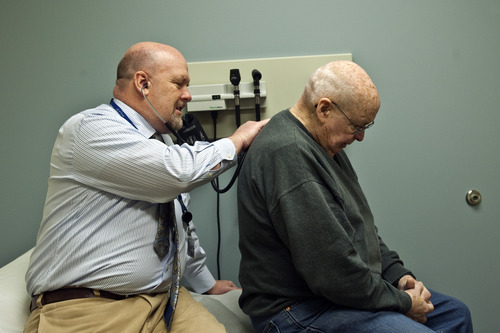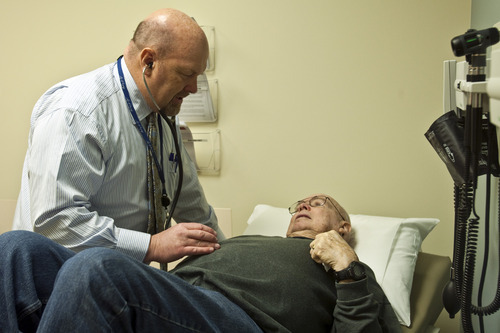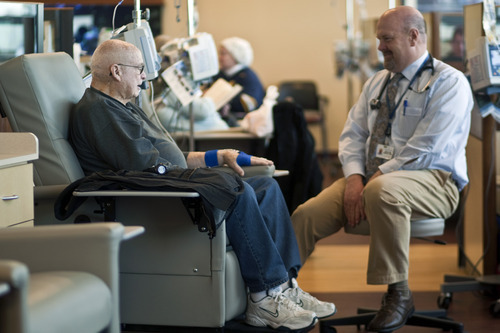This is an archived article that was published on sltrib.com in 2012, and information in the article may be outdated. It is provided only for personal research purposes and may not be reprinted.
Cancer doctors who want to give patients new "smart" drugs in their offices — a practice now forbidden in Utah — will soon take their case to the Legislature, arguing that the current law can make patients' lives more miserable and cost them too much money.
Supporters say SB161, sponsored by Sen. Curt Bramble, R-Provo and introduced Thursday, would be a way to ensure people with cancer have better access to newer drugs, which manufacturers increasingly are turning out in pills rather than medication given to patients intravenously in oncologists' offices or dedicated infusion centers.
Bramble, whose father died of cancer not long ago, said advocates for the changes to Utah's Pharmacy Act asked him to sponsor the bill. "I was sympathetic to the notion," he said. "Having a doctor dispense some of the drugs from their office might be a benefit to cancer patients."
Utah law says physicians may administer medications, but only pharmacists may dispense them. That means patients can get intravenous chemotherapy from a doctor but must go to a drug store to get the new smart pills, as well as medications that cancer patients must take between chemotherapy sessions. Besides Utah, only Wyoming and Texas have such a law.
New oral drugs focus on specific mutations in lung and kidney cancers, metastatic melanoma and other such cases, said William Nibley, an oncologist with Utah Cancer Specialists.
These medications now account for up to 35 percent of cancer drugs, a trend that is likely to continue, according to the Community Oncology Alliance, a national nonprofit group run by cancer specialists.
One more step • Syracuse resident Shayla Lister, 30, was diagnosed with invasive breast cancer and had a double mastectomy in May 2010. She has completed her chemotherapy and radiation treatments at the Huntsman Cancer Institute in Salt Lake City. She said insurance authorization hassles with Huntsman's on-site pharmacy prompted her to get her post-treatment medications at a retail drug store.
One of her prescriptions while under treatment was for a particularly expensive drug, Emend, that prevents nausea and vomiting. "If [Huntsman doctors] had just given them to me, I would be on my way," Lister said.
When she took the prescription to the retail pharmacy, sometimes the drug wasn't available. "I'd say, 'What? I have to take these right now,' " she said. "I would support [oncologists] giving me the Emend, the steroids, the others. I would be all for not having to take one more step."
Ogden resident Debra Berry, 50, had similar experiences during her breast cancer treatment after two mastectomies, chemo and radiation. When she first tried to fill her Emend prescription, she had to go to three retail pharmacies before finding one that had a single pill. She would have to go back another day for the rest.
She was sick, and worried about contact with others because chemotheraphy had weakened her immune system. So her husband picked up the slack, making multiple trips after work to fill a single prescription.
"It would be incredibly helpful if [oncologists] could dispense the pills," said Lister, who has worked in the neonatal intensive-care unit at Ogden Regional Hospital for more than 20 years.
The doctors, she said, aren't trying to dispense narcotics. "My oncologist said, for crying out loud, 'I already dispense chemo. What's the difference?' " Berry said. "As a nurse, I've never seen this side. I am jumping through various hoops with my insurance."
Berry was to have taken the estrogen-blocker Tamoxifen after her chemo to guard against cancer recurrence, but her body couldn't break it down. Her alternative prescription costs $1,000 per month. She has good insurance that covers the cost. "But if people didn't have insurance or had to pay 50 percent," she said, "it's too expensive."
Extra challenges for seniors • Prescribing oral cancer drugs to patients on Medicare, who comprise about half of all U.S. cancer patients, has extra complications.
When patients get intravenous chemotherapy at infusion centers, Medicare Part B picks up 80 percent of the cost. Supplemental Medigap policies pays the other 20 percent.
But aside from rare exceptions, the oral medications are covered only under the private drug plans that seniors select. These Part D plans, if they cover the meds at all, may require a co-payment of up to 50 percent.
The drugs cost thousands of dollars per month.
Many patients simply don't fill their prescriptions when they see the cost, a phenomenon called abandonment at the counter, according to studies by the advisory firm Avalere Health for the Community Oncology Alliance.
Or patients can't get their prescriptions filled because pharmacies don't stock such expensive drugs that are in relatively low demand. The study found Medicare beneficiaries abandoned their oral prescriptions almost twice as frequently as patients with non-Medicare insurance.
In rural areas, the situation is even worse. Retail pharmacists are reluctant to stock chemotherapy drugs because they are so expensive and would be wasted if the patient becomes too ill to continue the treatment.
The new oral drugs have proven superior to other therapies for some cancers, said Ted Okon, executive director of the Community Oncology Alliance. But high insurance co-payments discourage patients, who often don't know what the pills cost until they are at a pharmacy.
"These new oral cancer drugs are completely unaffordable," said Utah Cancer Specialist oncologist Nibley.
Nibley and other advocates say allowing doctors to dispense the drugs could mean better Medicare reimbursement under Part B rules.
That's why it's "imperative" that oncologists control medication dispensing, Okon said.
"When you disjoint the physician from the pharmacy," he said, "you're just asking for trouble." —
SB161's changes to state pharmacy law
The bill sponsored by Sen. Curt Bramble, R-Provo, would exempt cancer doctors from the state's Pharmacy Practice Act. Oncologists would be able to dispense "medically useful drugs" that:
Treat cancer.
Alleviate or minimize physical and psychological symptoms or pain.
Improve patient tolerance of cancer treatments.
Prepare a patient for a subsequent course of therapy.
Oncologists would not dispense narcotics. The exemption would apply only to drugs categorized by federal law as Schedule IV and V, which mean they have a relatively low potential for abuse.







